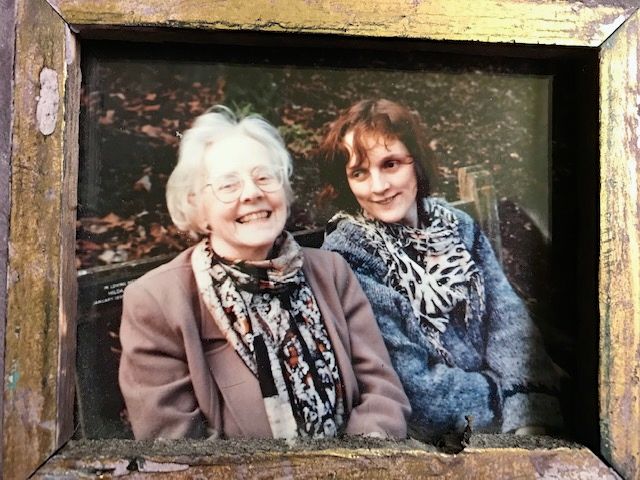My mother’s wedding on 9th February 1952 was almost derailed by the death of King George VI a few days earlier. My parents were to be married in church, even though neither was religious and they were not well-off (my father had to sell his bicycle to pay for the marriage licence.) The only blight on the occasion so far had been the refusal of my dad’s father to attend; he and my grandmother had divorced acrimoniously and her new husband was to be the wedding photographer.
The wedding went ahead and despite the chill February weather, the rain held off. My mother had made her own dress in cream satin damask and was extremely proud of it’s 22-inch waist; my sister and I outgrew it for dressing-up by our early teens. The cake was one of those postwar affairs composed largely of ersatz cardboard tiers, as sugar, butter and many other staples were still rationed, seven years after the end of the war.
Their planned honeymoon – a modest couple of days driving around the South East of England in a borrowed car – did have to be postponed, as virtually everything was closed for mourning until the king’s state funeral a week later.
Like many young women of the time, my mother identified strongly with the new Queen, although by the time of my parents’s marriage Elizabeth had been married for five years and aready had two children. There must have been something incredibly encouraging and exciting about the idea of someone your age – a woman! – ascending to the throne. Maybe it signalled a new era for women, who after their equal participation in the workforce during wartime had been relegated once again to hearth and home.
However, it would be decades before women had anything like equal status in law, let alone in real life: until the mid-seventies, a woman could not open a bank account in her own name, and until 1982 could legally be refused service in a pub.
My mother was a keen follower of fashion – always telling me which styles were currently ‘in’ or ‘out’, about which I could have cared less – and often made her own, and later our, clothes. The young Queen’s ever-changing, glamorous though modest, outfits must have brought a dash of brightness to the bleak postwar gloom of 1950s England. The coronation, a year later, would be a spectacular visual event.
The early years of my parents’ marriage, living in a tiny one-room flat in West London, were perhaps their better times together, although even then cracks were showing as my father devoted himself to work and studying for a night-school degree, leaving my mother often alone and at a loose end. By the end of the decade, much against my mother’s better judgement, they also had a child – me – and my sister was on the way. We moved out of London to a newly built house in the suburbs.
It was there, I think, that depression really took hold of my mother and would continue to stalk her for most of her life. She had never wanted to be a mother, and at one point had almost begun a promising career as a designer, which faltered when her much older boss, with whom she was having an affair, left her and broke her heart. Now, stuck with two small children in a place where she knew no-one, with no family support, and with my father’s attention clearly wandering, she must have wondered how it had come to this.
Meanwhile the Queen’s life carried on in the background – a busy working woman, living in palaces with a fleet of staff, travelling around the world, raising her children somewhat at arm’s length. What on earth did these two women have in common? And yet – like many of her generation – my mother continued to think of Elizabeth as a fellow-traveller and kind of role model. Answering the phone, she always put on a slightly posh accent – “Helleuw?” – and we joked that she was imitating Her Maj.
The monarchy was a sort-of unstated backdrop to our lives. As a family we watched the not-quite ‘fly-on-the-wall’ documentary about the Royal Family at home with great interest, and at school I did a project about the Investiture of the Prince of Wales. My mother continued in this vein – whilst not exactly following the royals avidly, she always knew what the Queen was up to, whereas to me they have long been a mostly benign irrelevance, and my son would abolish them forthwith.
For many people, this week’s wall-to-wall media coverage, and the re-hashing (some might say re-writing) of seventy years of history to rebrand the Queen as a sort of grandmother-figure to us, have inevitably focussed thoughts on our own parents. My mother’s life was not one either of personal fulfilment or wordly influence, and her death ten years ago – aged 85 and lost to Alzheimers – was a quite different affair. But she lived, as it were, alongside the Queen for more than eight decades, through often very turbulent times and events, and framed by a rapidly-changing social and emotional landscape.
This week feels like the final echo of my mother’s journey as a twentieth-century woman.











You must be logged in to post a comment.